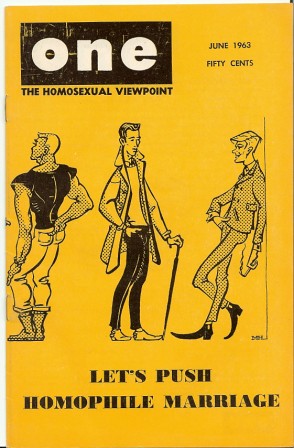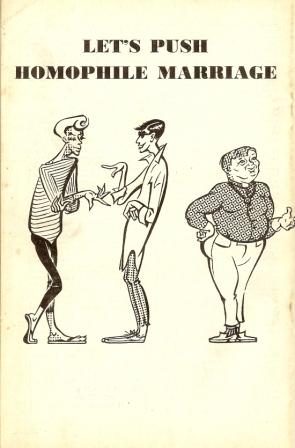 The cover of the June 1963 issue of One magazine “The Homosexual Viewpoint” reads LET’S PUSH HOMOPHILE MARRIAGE. The poncey illustration is worth a click to the permalink page, as are the tips for finding and keeping a man. (Are the tips totally dated? You decide.)
The cover of the June 1963 issue of One magazine “The Homosexual Viewpoint” reads LET’S PUSH HOMOPHILE MARRIAGE. The poncey illustration is worth a click to the permalink page, as are the tips for finding and keeping a man. (Are the tips totally dated? You decide.)
Though i’m pretty familiar with the homo timeline, current events put it in my head to expect insight into the early days of our current fight for civil recognition of our relationships. That turned out to be a bit of an anachronism. In 1963–six years before Stonewall, 43-years before now, ten years before i was born (uh, ok three years)–it was so impossible to contemplate the

state recognizing our relationships, that it’s not even mentioned in passing, flippantly, or with sarcasm in the course of this long piece.
What was the priority? Convincing themselves and others of the generation that some facsimile of hetero marriage was a viable option for some portion of the community that wanted it.
And it was a particularly hard sell. Nascent homo activists, experimenting with feeling good about themselsves found these discussions to be critical of their lives, and of the furtive, one-time, sexual hook ups that defined the homo culture. The prevailing heterosexual attitude was disdain for the promiscuity with which “they drive us underground and force us to live 95% of our lives “passing” as heteros with so little time left to socialize with other homosexuals ….To find a marriage partner, one must meet many prospects on a social basis, not on a furtive and desperate wham-bam-thank-you-ma’am basis.”
Lloyd has the zeal of the recently converted, (which he is, not always having been the marrying type.) and keeps plugging and encourages those who might find it interesting to go forth, meet as many men as possible, but “don’t fritter away your sexual energy while you shop around. A play gets its notices, reviews, reputation and advance sale from opening night.” Among his other guiding rules for a successful homophile marriage:
- “If you don’t cook, look for somebody who can.”
- “Don’t expect to be continually amused.”
- “Don’t be afraid to go into communal debt.”
- “Keep the gut down.”
- “Don’t worry in advance aabout what your heterosexual mother, father, sisters, brothers, or neighbors “will say” about your homophile marriage….The chances are they will never “say” anything. And you will probably be so happy that you will be the one who wants to speak up. But keep your big mouth shut.”
- “Go to a private M.D. and tell him you want a Wasserman cause you had a few too many…in a hotel bar…picked up this girl…Phoebe…VD.”
- “Keep clean. All over.”
I came away feeling that the the ambivalence many of us are so uncomfortable feeling at this exciting time is nothing new and in fact connects us to those who came before. Whether it’s the messed up result of the trauma and damage growing up gay or the beginnings of an evolutionary track toward higher-order structures for humans to live by, we won’t know for a while.
And, critiques and ambivalences aside, it’s pretty clear that most of our own people have come to agree that as flawed or wonderful as it may be, we should have just the same rights as anyone else to make the choices about how we want to organize and structure our lives for ourselves. We’ve spent probably a decade each working throgh issues on by being raised in a heterosexual family, of being forced to lie about who we were, and worse.
We’ve all done the work, as a shrink once told me.
